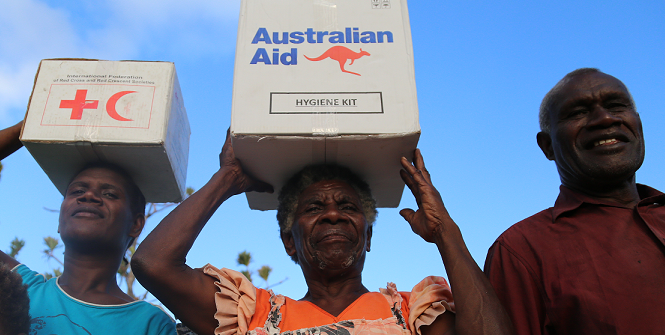Australia Pledges to Strengthen Humanitarian Action

Under new joint pledges, the Australian Government and Australian Red Cross will work together to strengthen international humanitarian law, protect vulnerable migrants, strengthen humanitarian agencies in the Pacific and promote social cohesion and non-violence.
Australia joined 194 countries at the International Conference of the Red Cross and Red Crescent from 8-10 December. Held every four years, the International Conference brings together all members of the International Red Cross Red Crescent Movement, together with all states party to the Geneva Conventions. Together, conference delegates negotiate formal outcomes that commit governments and the Movement to work together on key humanitarian issues.
Failure to strengthen compliance with rules of war
At the Conference, a much-anticipated resolution to increase compliance with international humanitarian law (IHL) failed to pass.
Disturbing trends in today’s armed conflicts reflect the need for genuine action to increase compliance with IHL. Attacks on healthcare workers and facilities, such as the bombing of the Hospital run by Médecins Sans Frontières in Kunduz, Afghanistan, occur with devastating regularity despite their protected status under the laws of war. Explosive weapons indiscriminately deployed in urban areas cause alarming rates of civilian casualties and destruction of buildings and infrastructure that are necessary for the survival and dignity of those who live in war-torn areas. Meanwhile, civilian men, women, and children experience appalling and unacceptable rates of sexual violence in armed conflicts.
At the Conference a cautious step towards addressing this issue was put forward. A draft resolution was presented by the International Committee of the Red Cross and the Swiss Government, proposing the creation of a voluntary but regular meeting of states to provide countries with a non-political, non-contextual forum. This forum would promote and support universal respect for IHL, enable exchanges on practical experiences and challenges in the implementation of IHL and encourage the sharing of best practices.
Unfortunately, the proposed resolution was not adopted and the International Conference resolved, instead, to continue discussing ways towards improved and strengthened compliance over the next four years. The resolution as it was eventually adopted calls for the “continuation” of a state-driven inter-governmental process to find ways to enhance the implementation of IHL using the potential of existing forums and to submit the outcomes of this process to the 33rd International Conference of the Red Cross and Red Crescent in four years time.
‘This is a missed opportunity,’ Dr Phoebe Wynn-Pope, Director of International Humanitarian Law for Australian Red Cross, said after the Conference. ‘Not since the second world war have we seen human suffering on such an overwhelming scale, nor such an urgent need to armed actors to comply with their obligations under international law.
‘We know that people who play no part in the fighting bear the burden of today’s armed conflicts – civilians, healthcare workers, and other humanitarian actors – and we know that compliance with IHL is the only way to protect them’.
Resolutions successfully adopted
‘Despite the setback, there remains much to celebrate,’ Dr Wynn-Pope said. ‘States agreed on a number of other resolutions that will provide the Red Cross Red Crescent Movement with a strong foundation for action’.
Resolutions successfully adopted at the Conference included: commitment to working together to prevent sexual and gender-based violence; enhancing protections for people in detention; strengthening protections for humanitarian volunteers and health care workers; and establishing laws and procedures to support humanitarian responses to disasters.
Australia’s humanitarian pledges
In addition to the formal resolutions that bind all members of the Conference, States and Red Cross and Red Crescent National Societies can made voluntary commitments on related topics in the form of “pledges”. Australian Red Cross and the Australian Government were pleased to sign a number of joint pledges on key topics.
Pledges made by the Australian Government and Australian Red Cross included:
- Improving understanding of Australian Red Cross’ auxiliary role and its practical application in the humanitarian field.
- Strengthening the implementation and dissemination of international humanitarian law.
- Ensuring humanitarian access to persons in immigration detention.
- Promoting non-violence and respect for cultural, linguistic and religious diversity.
- Strengthening local humanitarian action with a focus on the Pacific.
- Working with all sectors of the Australian community to reduce risks in disasters.
- Finding ways to protect the dignity and safety of migrants in the Asia-Pacific region.
- Preventing and addressing human trafficking, slavery, forced marriage and forced labour.
Each pledge comes with a four-year plan of action, jointly implemented by Australian Red Cross and the Australian Government.
‘These pledges highlight the unique auxiliary relationship that exists between Red Cross and the public authorities,’ said Dr Wynn-Pope.
‘We are committed to working together to protect the safety and dignity of those affected by armed conflict and other emergencies – in our country, our region and beyond,’ Dr Wynn-Pope said.
The resolutions and pledges will significantly shape Australian Red Cross’ work in the coming years. Dr Wynn-Pope said: ‘Whatever unknown challenges the future holds, Australian Red Cross will continue to work for the protection of the most vulnerable, the rights and dignity of those affected by war and disaster, and to call for compliance with the laws of armed conflict’.
This article was written by Zayne D’Crus and Pip Ross and is a part of an ongoing series by the Australian Red Cross. It may be republished under a Creative Commons License.


